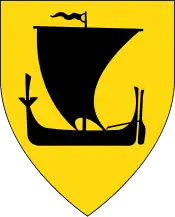Sortland Municipality
Sortland kommune Suorttá suohkan | |
|---|---|
 View of Sortland from Strandheia mountain | |
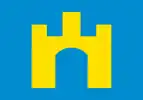 Flag | |
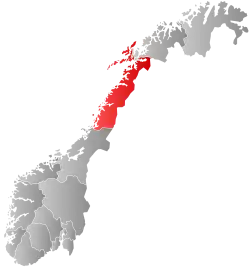 Nordland within Norway | |
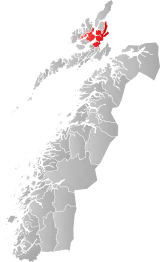 Sortland within Nordland | |
| Coordinates: 68°42′31″N 15°16′51″E / 68.70861°N 15.28083°E | |
| Country | Norway |
| County | Nordland |
| District | Vesterålen |
| Established | 1841 |
| • Preceded by | Hadsel Municipality |
| Administrative centre | Sortland |
| Government | |
| • Mayor (2023) | Grete Ellingsen (H) |
| Area | |
| • Total | 721.95 km2 (278.75 sq mi) |
| • Land | 697.34 km2 (269.24 sq mi) |
| • Water | 24.60 km2 (9.50 sq mi) 3.4% |
| • Rank | #159 in Norway |
| Population (2023) | |
| • Total | 10,561 |
| • Rank | #109 in Norway |
| • Density | 15.1/km2 (39/sq mi) |
| • Change (10 years) | |
| Demonym | Sortlending[1] |
| Official language | |
| • Norwegian form | Neutral |
| Time zone | UTC+01:00 (CET) |
| • Summer (DST) | UTC+02:00 (CEST) |
| ISO 3166 code | NO-1870[3] |
| Website | Official website |
ⓘ (Norwegian) or Suortá (Northern Sami)[4] is a municipality in Nordland county, Norway. It is part of the traditional region of Vesterålen. The administrative centre of the municipality is the town of Sortland. Other population centres in Sortland include Bø, Holand, Holmstad, Liland, Sigerfjord, Strand, and Vik. The Norwegian Coast Guard has its northern base in Sortland, called Kystvaktskvadron Nord.
In 1997, the municipal council declared "town status" for the urban area of Sortland. Sortland is the largest town and commercial centre in Vesterålen. The town of Sortland is located close to the Sortland Bridge which crosses the Sortlandsundet strait and connects the two large islands of Langøya and Hinnøya by road. Since a lot of houses in the town are painted blue, Sortland is sometimes referred to as "the blue city".
The 722-square-kilometre (279 sq mi) municipality is the 159th largest by area out of the 356 municipalities in Norway. Sortland is the 109th most populous municipality in Norway with a population of 10,561. The municipality's population density is 15.1 inhabitants per square kilometre (39/sq mi) and its population has increased by 4.8% over the previous 10-year period.[5][6] In January 2012, the number of citizens in Sortland reached 10,000 for the first time.[7]
General information
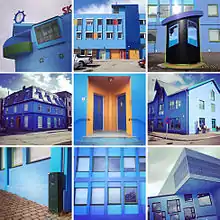
The municipality of Sortland was established in 1841 when it was separated from the large Hadsel Municipality.[8]
During the 1960s, there were many municipal mergers across Norway due to the work of the Schei Committee. On 1 January 1963, the Holm area (population: 65) along the Gavlfjorden was transferred from Langenes Municipality to Sortland. Also on that date, the area around the inner and western part of the Eidsfjorden (population: 1,360) was transferred from Hadsel Municipality to Sortland.[8]
On 1 January 2000, the area surrounding the Godfjorden was transferred from Kvæfjord Municipality (and Troms county) to Sortland (and Nordland county).[9]
Name
The municipality (originally the parish) is named after the old Sortland farm (Old Norse: Svortuland) since the first Sortland Church was built there. The first element is Svort which is the genitive case of the local river name Svorta. The river name is derived from svartr which means "black" or "dark". The last element is land which means "land" or "farm".[10]
On 2 May 2017, the national government approved a resolution to add a co-equal, official Sami language name for the municipality: Suortá.[11] The spelling of the Sami language name changes depending on how it is used. It is called Suortá when it is spelled alone, but it is Suorttá suohkan when using the Sami language equivalent to "Sortland municipality".[12]
Coat of arms
The coat of arms was granted on 15 March 1985. The official blazon is "Azure, a castle with three towers without crenelation Or" (Norwegian: I blått en gull borg med tre tårn uten krenelering). This means the arms have a blue field (background) and the charge is a castle with a gate and three towers without crenelation. The castle has a tincture of Or which means it is commonly colored yellow, but if it is made out of metal, then gold is used. The blue color in the field symbolizes the importance of sea and the castle is an updated version of an old coat of arms for Sortland. The castle gate symbolizes Sortland as the gateway to the Vesterålen region and that it is the commercial centre of the region as well. The arms were designed by Kurt Myrland.[13][14][15]
The old coat of arms was in use from the 1950s until 1985 when the new arms were granted. The arms showed a castle (very similar to the one in the current arms) in a stylized landscape, including waves and sun rays. The arms included a golden border with three black-white-black piles issuing from both flanks of the white castle. Also, there were four red sun rays issuing from behind the castle (four piles issuant from chief and flanks conjoined in heart), and in the base there were waves of red, black, and white. In the white chief inscribed the word "Sortland". A mural crown with four embattlements was on the top.[14][16]
 Former coat of arms of Sortland (1950s-1985)
Former coat of arms of Sortland (1950s-1985) Current arms (since 1985)
Current arms (since 1985)
Churches
The Church of Norway has one parish (sokn) within the municipality of Sortland. It is part of the Vesterålen prosti (deanery) in the Diocese of Sør-Hålogaland.
| Parish (sokn) | Church name | Location of the church | Year built |
|---|---|---|---|
| Sortland | Indre Eidsfjord Church | Holmstad | 1970 |
| Sigerfjord Church | Sigerfjord | 1933 | |
| Sortland Church | Sortland | 1901 |
Geography
The municipality of Sortland is located on the islands of Langøya and Hinnøya in the Vesterålen archipelago. The municipality surrounds the inner part of the Eidsfjorden and the Sortlandssundet strait. There are several bridges in the municipality including Djupfjordstraumen Bridge, Kvalsaukan Bridge, and Sortland Bridge. The Sortland Bridge is located just north of the town of Sortland. One of the main roads through the municipality is Norwegian County Road 82. The mountain Møysalen and part of Møysalen National Park are located in southern Sortland.
Midnight Sun and Aurora Borealis
The midnight sun occurs from May 23 to July 23. Great places to observe the midnight sun includes the Sortland Bridge, Ramnflauget, Godfjorden, Holm, and Skytterhaugen in the Vestmarka residential area. Because of Sortland's high latitude, there is no real darkness between late April and mid-August.
Polar night occurs in Sortland from 30 November to 12 January when the sun remains below the horizon and is not visible at all. The return of the sun is an occasion for celebration in Northern Norway, known as "Soldagen" (lit. Day of the sun) which is commonly celebrated with children getting the day off from school. The polar night does not mean that it becomes totally dark, typically daylight is visible for a few hours around noon.
Sortland and the Vesterålen region are perfect for observing the spectacular Aurora Borealis (Northern Lights) phenomenon. The aurora borealis trails its multi coloured banner across the sky and the moon lights the scene making it a breathtaking experience. Pictures taken here have been presented in National Geographic Magazine.
Climate
Sortland has a subpolar oceanic climate. The weather station (Sortland-Kleiva) has been recording since January 1956. The record high of 31 °C (88 °F) was set on July 29, 2018. The record low −13.5 °C (7.7 °F) was set in January 2016 (extremes available since 2004). The average date for the last overnight freeze (low below 0 °C (32.0 °F)) in spring is 7 May[17] and average date for first freeze in autumn is 14 October[18] giving a frost-free season of 159 days (1981-2010 average).
| Climate data for Sortland - Kleiva 1991-2020 (14 m, extremes 2004-2022) | |||||||||||||
|---|---|---|---|---|---|---|---|---|---|---|---|---|---|
| Month | Jan | Feb | Mar | Apr | May | Jun | Jul | Aug | Sep | Oct | Nov | Dec | Year |
| Record high °C (°F) | 9.7 (49.5) |
8.2 (46.8) |
9.5 (49.1) |
17.6 (63.7) |
22.5 (72.5) |
29.3 (84.7) |
31 (88) |
30.3 (86.5) |
22.6 (72.7) |
18.2 (64.8) |
12 (54) |
10.1 (50.2) |
31 (88) |
| Daily mean °C (°F) | −0.8 (30.6) |
−1.3 (29.7) |
−0.3 (31.5) |
2.3 (36.1) |
6.4 (43.5) |
10 (50) |
13.1 (55.6) |
12.4 (54.3) |
9.1 (48.4) |
4.6 (40.3) |
1.9 (35.4) |
0.1 (32.2) |
4.8 (40.6) |
| Record low °C (°F) | −13.5 (7.7) |
−11.1 (12.0) |
−12.1 (10.2) |
−7.3 (18.9) |
−4.4 (24.1) |
1.1 (34.0) |
5.1 (41.2) |
3 (37) |
−1.2 (29.8) |
−3.3 (26.1) |
−9.2 (15.4) |
−10.1 (13.8) |
−13.5 (7.7) |
| Average precipitation mm (inches) | 160 (6.3) |
174 (6.9) |
150 (5.9) |
110 (4.3) |
82 (3.2) |
78 (3.1) |
60 (2.4) |
90 (3.5) |
116 (4.6) |
168 (6.6) |
139 (5.5) |
171 (6.7) |
1,498 (59) |
| Source: eklima/Norwegian Meteorological Institute[19] | |||||||||||||
Earlier weather station
| Climate data for Sortland 1991-2020 (3 m) | |||||||||||||
|---|---|---|---|---|---|---|---|---|---|---|---|---|---|
| Month | Jan | Feb | Mar | Apr | May | Jun | Jul | Aug | Sep | Oct | Nov | Dec | Year |
| Mean daily maximum °C (°F) | 1.8 (35.2) |
1.4 (34.5) |
2.5 (36.5) |
5.5 (41.9) |
9.8 (49.6) |
12.6 (54.7) |
15.7 (60.3) |
15.4 (59.7) |
12.1 (53.8) |
7.3 (45.1) |
4.4 (39.9) |
2.7 (36.9) |
7.7 (45.9) |
| Daily mean °C (°F) | −0.8 (30.6) |
−1.1 (30.0) |
−0.2 (31.6) |
2.7 (36.9) |
6.6 (43.9) |
9.7 (49.5) |
12.5 (54.5) |
12.3 (54.1) |
9.3 (48.7) |
5.0 (41.0) |
2.1 (35.8) |
0.2 (32.4) |
4.8 (40.6) |
| Mean daily minimum °C (°F) | −3.4 (25.9) |
−3.7 (25.3) |
−2.8 (27.0) |
−0.1 (31.8) |
3.8 (38.8) |
7.4 (45.3) |
10.2 (50.4) |
9.8 (49.6) |
6.8 (44.2) |
2.6 (36.7) |
−0.4 (31.3) |
−2.3 (27.9) |
2.4 (36.3) |
| Average precipitation mm (inches) | 152.2 (5.99) |
138.6 (5.46) |
141.2 (5.56) |
88.9 (3.50) |
65.6 (2.58) |
59.1 (2.33) |
62.2 (2.45) |
76.4 (3.01) |
129.2 (5.09) |
168.7 (6.64) |
139.9 (5.51) |
174.2 (6.86) |
1,396.2 (54.97) |
| Source 1: eklima/Norwegian Meteorological Institute[20] | |||||||||||||
| Source 2: NOAA[21] | |||||||||||||
| Climate data for Kleiva, Sortland (1961-90) | |||||||||||||
|---|---|---|---|---|---|---|---|---|---|---|---|---|---|
| Month | Jan | Feb | Mar | Apr | May | Jun | Jul | Aug | Sep | Oct | Nov | Dec | Year |
| Mean daily maximum °C (°F) | 0.0 (32.0) |
0.1 (32.2) |
1.4 (34.5) |
4.1 (39.4) |
8.9 (48.0) |
13.1 (55.6) |
15.5 (59.9) |
14.9 (58.8) |
10.7 (51.3) |
6.5 (43.7) |
2.7 (36.9) |
0.7 (33.3) |
6.6 (43.9) |
| Daily mean °C (°F) | −2.1 (28.2) |
−1.9 (28.6) |
−0.9 (30.4) |
1.9 (35.4) |
6.4 (43.5) |
10.2 (50.4) |
12.5 (54.5) |
12.2 (54.0) |
8.4 (47.1) |
4.6 (40.3) |
0.8 (33.4) |
−1.3 (29.7) |
4.2 (39.6) |
| Mean daily minimum °C (°F) | −4.5 (23.9) |
−4.4 (24.1) |
−3.5 (25.7) |
−0.8 (30.6) |
3.3 (37.9) |
7.1 (44.8) |
9.5 (49.1) |
9.1 (48.4) |
5.8 (42.4) |
2.3 (36.1) |
−1.4 (29.5) |
−3.7 (25.3) |
1.6 (34.9) |
| Average precipitation mm (inches) | 135 (5.3) |
123 (4.8) |
98 (3.9) |
85 (3.3) |
65 (2.6) |
67 (2.6) |
80 (3.1) |
89 (3.5) |
140 (5.5) |
205 (8.1) |
159 (6.3) |
151 (5.9) |
1,397 (55.0) |
| Average precipitation days (≥ 1 mm) | 17.0 | 15.2 | 14.4 | 13.9 | 11.2 | 11.7 | 13.2 | 12.0 | 16.3 | 19.0 | 17.2 | 17.5 | 178.6 |
| Source: Norwegian Meteorological Institute[22] | |||||||||||||
Government
All municipalities in Norway are responsible for primary education (through 10th grade), outpatient health services, senior citizen services, welfare and other social services, zoning, economic development, and municipal roads and utilities. The municipality is governed by a municipal council of directly elected representatives. The mayor is indirectly elected by a vote of the municipal council.[23] The municipality is under the jurisdiction of the Midtre Hålogaland District Court and the Hålogaland Court of Appeal.
Municipal council
The municipal council (Kommunestyre) of Sortland is made up of 27 representatives that are elected to four year terms. The tables below show the current and historical composition of the council by political party.
| Party name (in Norwegian) | Number of representatives | |
|---|---|---|
| Labour Party (Arbeiderpartiet) | 4 | |
| Progress Party (Fremskrittspartiet) | 2 | |
| Green Party (Miljøpartiet De Grønne) | 1 | |
| Conservative Party (Høyre) | 12 | |
| Industry and Business Party (Industri- og Næringspartiet) | 1 | |
| Red Party (Rødt) | 2 | |
| Centre Party (Senterpartiet) | 2 | |
| Socialist Left Party (Sosialistisk Venstreparti) | 2 | |
| Liberal Party (Venstre) | 1 | |
| Total number of members: | 27 | |
| Party name (in Norwegian) | Number of representatives | |
|---|---|---|
| Labour Party (Arbeiderpartiet) | 5 | |
| Progress Party (Fremskrittspartiet) | 2 | |
| Green Party (Miljøpartiet De Grønne) | 1 | |
| Conservative Party (Høyre) | 7 | |
| Red Party (Rødt) | 3 | |
| Centre Party (Senterpartiet) | 7 | |
| Socialist Left Party (Sosialistisk Venstreparti) | 2 | |
| Total number of members: | 27 | |
| Party name (in Norwegian) | Number of representatives | |
|---|---|---|
| Labour Party (Arbeiderpartiet) | 8 | |
| Progress Party (Fremskrittspartiet) | 2 | |
| Conservative Party (Høyre) | 11 | |
| Red Party (Rødt) | 3 | |
| Centre Party (Senterpartiet) | 2 | |
| Socialist Left Party (Sosialistisk Venstreparti) | 1 | |
| Total number of members: | 27 | |
| Party name (in Norwegian) | Number of representatives | |
|---|---|---|
| Labour Party (Arbeiderpartiet) | 9 | |
| Progress Party (Fremskrittspartiet) | 4 | |
| Conservative Party (Høyre) | 10 | |
| Red Party (Rødt) | 2 | |
| Centre Party (Senterpartiet) | 1 | |
| Socialist Left Party (Sosialistisk Venstreparti) | 1 | |
| Total number of members: | 27 | |
| Party name (in Norwegian) | Number of representatives | |
|---|---|---|
| Labour Party (Arbeiderpartiet) | 12 | |
| Progress Party (Fremskrittspartiet) | 7 | |
| Conservative Party (Høyre) | 7 | |
| Christian Democratic Party (Kristelig Folkeparti) | 1 | |
| Red Electoral Alliance (Rød Valgallianse) | 2 | |
| Centre Party (Senterpartiet) | 3 | |
| Socialist Left Party (Sosialistisk Venstreparti) | 3 | |
| Total number of members: | 35 | |
| Party name (in Norwegian) | Number of representatives | |
|---|---|---|
| Labour Party (Arbeiderpartiet) | 9 | |
| Progress Party (Fremskrittspartiet) | 5 | |
| Conservative Party (Høyre) | 8 | |
| Christian Democratic Party (Kristelig Folkeparti) | 1 | |
| Red Electoral Alliance (Rød Valgallianse) | 1 | |
| Centre Party (Senterpartiet) | 4 | |
| Socialist Left Party (Sosialistisk Venstreparti) | 6 | |
| Liberal Party (Venstre) | 1 | |
| Total number of members: | 35 | |
| Party name (in Norwegian) | Number of representatives | |
|---|---|---|
| Labour Party (Arbeiderpartiet) | 9 | |
| Progress Party (Fremskrittspartiet) | 3 | |
| Conservative Party (Høyre) | 10 | |
| Christian Democratic Party (Kristelig Folkeparti) | 2 | |
| Red Electoral Alliance (Rød Valgallianse) | 2 | |
| Centre Party (Senterpartiet) | 4 | |
| Socialist Left Party (Sosialistisk Venstreparti) | 4 | |
| Liberal Party (Venstre) | 1 | |
| Total number of members: | 35 | |
| Party name (in Norwegian) | Number of representatives | |
|---|---|---|
| Labour Party (Arbeiderpartiet) | 8 | |
| Progress Party (Fremskrittspartiet) | 2 | |
| Conservative Party (Høyre) | 8 | |
| Christian Democratic Party (Kristelig Folkeparti) | 2 | |
| Red Electoral Alliance (Rød Valgallianse) | 2 | |
| Centre Party (Senterpartiet) | 7 | |
| Socialist Left Party (Sosialistisk Venstreparti) | 3 | |
| Joint list of the Liberals and Independent voters (Venstre og Uavhengige Velgere) |
3 | |
| Total number of members: | 35 | |
| Party name (in Norwegian) | Number of representatives | |
|---|---|---|
| Labour Party (Arbeiderpartiet) | 13 | |
| Progress Party (Fremskrittspartiet) | 2 | |
| Conservative Party (Høyre) | 8 | |
| Christian Democratic Party (Kristelig Folkeparti) | 2 | |
| Centre Party (Senterpartiet) | 4 | |
| Socialist Left Party (Sosialistisk Venstreparti) | 5 | |
| Liberal Party (Venstre) | 1 | |
| Total number of members: | 35 | |
| Party name (in Norwegian) | Number of representatives | |
|---|---|---|
| Labour Party (Arbeiderpartiet) | 13 | |
| Progress Party (Fremskrittspartiet) | 3 | |
| Conservative Party (Høyre) | 10 | |
| Christian Democratic Party (Kristelig Folkeparti) | 2 | |
| Centre Party (Senterpartiet) | 2 | |
| Socialist Left Party (Sosialistisk Venstreparti) | 3 | |
| Liberal Party (Venstre) | 2 | |
| Total number of members: | 35 | |
| Party name (in Norwegian) | Number of representatives | |
|---|---|---|
| Labour Party (Arbeiderpartiet) | 13 | |
| Progress Party (Fremskrittspartiet) | 1 | |
| Conservative Party (Høyre) | 8 | |
| Christian Democratic Party (Kristelig Folkeparti) | 2 | |
| Centre Party (Senterpartiet) | 2 | |
| Socialist Left Party (Sosialistisk Venstreparti) | 4 | |
| Liberal Party (Venstre) | 2 | |
| Sigerfjord Area Non-party List (Sigerfjord og Omlands upolitiske liste) | 2 | |
| Indre Eidsfjord List (Indre Eidsfjord Liste) | 1 | |
| Total number of members: | 35 | |
| Party name (in Norwegian) | Number of representatives | |
|---|---|---|
| Labour Party (Arbeiderpartiet) | 11 | |
| Conservative Party (Høyre) | 9 | |
| Christian Democratic Party (Kristelig Folkeparti) | 3 | |
| Centre Party (Senterpartiet) | 3 | |
| Socialist Left Party (Sosialistisk Venstreparti) | 3 | |
| Liberal Party (Venstre) | 2 | |
| Sigerfjord Area Non-party List (Sigerfjord og Omlands upolitiske liste) | 2 | |
| Indre Eidsfjord List (Indre Eidsfjord Liste) | 2 | |
| Total number of members: | 35 | |
| Party name (in Norwegian) | Number of representatives | |
|---|---|---|
| Labour Party (Arbeiderpartiet) | 12 | |
| Conservative Party (Høyre) | 5 | |
| Christian Democratic Party (Kristelig Folkeparti) | 3 | |
| Centre Party (Senterpartiet) | 6 | |
| Socialist Left Party (Sosialistisk Venstreparti) | 3 | |
| Liberal Party (Venstre) | 2 | |
| Sigerfjord Area List (Sigerfjord og Omlands Liste) | 4 | |
| Total number of members: | 35 | |
| Party name (in Norwegian) | Number of representatives | |
|---|---|---|
| Labour Party (Arbeiderpartiet) | 15 | |
| Conservative Party (Høyre) | 3 | |
| Christian Democratic Party (Kristelig Folkeparti) | 3 | |
| Centre Party (Senterpartiet) | 5 | |
| Socialist People's Party (Sosialistisk Folkeparti) | 3 | |
| Liberal Party (Venstre) | 2 | |
| Local List(s) (Lokale lister) | 4 | |
| Total number of members: | 35 | |
| Party name (in Norwegian) | Number of representatives | |
|---|---|---|
| Labour Party (Arbeiderpartiet) | 16 | |
| Conservative Party (Høyre) | 4 | |
| Christian Democratic Party (Kristelig Folkeparti) | 3 | |
| Centre Party (Senterpartiet) | 3 | |
| Socialist People's Party (Sosialistisk Folkeparti) | 3 | |
| Liberal Party (Venstre) | 3 | |
| Local List(s) (Lokale lister) | 3 | |
| Total number of members: | 35 | |
| Party name (in Norwegian) | Number of representatives | |
|---|---|---|
| Labour Party (Arbeiderpartiet) | 17 | |
| Conservative Party (Høyre) | 4 | |
| Christian Democratic Party (Kristelig Folkeparti) | 3 | |
| Centre Party (Senterpartiet) | 2 | |
| Socialist People's Party (Sosialistisk Folkeparti) | 2 | |
| Liberal Party (Venstre) | 4 | |
| Local List(s) (Lokale lister) | 3 | |
| Total number of members: | 35 | |
| Party name (in Norwegian) | Number of representatives | |
|---|---|---|
| Labour Party (Arbeiderpartiet) | 10 | |
| Conservative Party (Høyre) | 3 | |
| Christian Democratic Party (Kristelig Folkeparti) | 2 | |
| Centre Party (Senterpartiet) | 2 | |
| Liberal Party (Venstre) | 3 | |
| Local List(s) (Lokale lister) | 3 | |
| Total number of members: | 23 | |
| Party name (in Norwegian) | Number of representatives | |
|---|---|---|
| Labour Party (Arbeiderpartiet) | 11 | |
| Conservative Party (Høyre) | 1 | |
| Christian Democratic Party (Kristelig Folkeparti) | 2 | |
| Farmers' Party (Bondepartiet) | 1 | |
| Liberal Party (Venstre) | 4 | |
| Local List(s) (Lokale lister) | 4 | |
| Total number of members: | 23 | |
| Party name (in Norwegian) | Number of representatives | |
|---|---|---|
| Labour Party (Arbeiderpartiet) | 11 | |
| Conservative Party (Høyre) | 1 | |
| Farmers' Party (Bondepartiet) | 1 | |
| Liberal Party (Venstre) | 6 | |
| Local List(s) (Lokale lister) | 1 | |
| Total number of members: | 20 | |
| Party name (in Norwegian) | Number of representatives | |
|---|---|---|
| Labour Party (Arbeiderpartiet) | 11 | |
| Conservative Party (Høyre) | 3 | |
| Communist Party (Kommunistiske Parti) | 1 | |
| Liberal Party (Venstre) | 5 | |
| Total number of members: | 20 | |
| Party name (in Norwegian) | Number of representatives | |
|---|---|---|
| Labour Party (Arbeiderpartiet) | 14 | |
| Christian Democratic Party (Kristelig Folkeparti) | 1 | |
| Liberal Party (Venstre) | 3 | |
| Joint List(s) of Non-Socialist Parties (Borgerlige Felleslister) | 1 | |
| Local List(s) (Lokale lister) | 1 | |
| Total number of members: | 20 | |
| Party name (in Norwegian) | Number of representatives | |
|---|---|---|
| Labour Party (Arbeiderpartiet) | 11 | |
| Liberal Party (Venstre) | 4 | |
| List of workers, fishermen, and small farmholders (Arbeidere, fiskere, småbrukere liste) | 3 | |
| Local List(s) (Lokale lister) | 2 | |
| Total number of members: | 20 | |
| Note: Due to the German occupation of Norway during World War II, no elections were held for new municipal councils until after the war ended in 1945. | ||
Mayors
The mayors (Norwegian: ordfører) of Sortland:
- 1841-1841: Abel Ellingsen
- 1842-1843: Jørgen Ottesen
- 1844-1852: Abel Ellingsen
- 1853-1856: C.H. Schanche
- 1857-1868: Abel Ellingsen
- 1869-1870: Laurits Ottesen
- 1871-1874: Anton Holst
- 1875-1876: Kristoffer Johnsen
- 1877-1880: Laurits Ottesen
- 1881-1882: E. Dietrichen
- 1883-1884: Laurits Ottesen
- 1885-1892: H. Knudsen
- 1893-1894: H.M. Stoltz
- 1895-1896: Jens N.A. Ellingsen
- 1897-1901: H. Knudsen
- 1902-1904: H.M. Stoltz
- 1905-1907: H. Knudsen
- 1908-1910: H.M. Stoltz
- 1911-1913: Georg Ellingsen
- 1914-1916: Olaf Holm
- 1917-1919: J.D. Hammer
- 1920-1922: Bernhard J. Steiro
- 1923-1925: Dag Ellingsen
- 1926-1926: Per Lunde
- 1927-1928: Andreas Thomassen
- 1929-1931: Anton J. Myhre
- 1932-1934: Ottar Lunde
- 1935-1936: Halvdan Bygdnes
- 1937-1940: P.C. Reinsnes (Ap)
- 1946-1959: P.C. Reinsnes (Ap)
- 1960-1962: Ottar Wik
- 1963-1975: P.C. Reinsnes (Ap)
- 1976-1979: Thormod Olsen (H)
- 1980-1981: Terje Johanssen
- 1982-1987: Anton Pettersen
- 1988-1994: Hill-Marta Solberg (Ap)
- 1994-1995: Ronald Steen
- 1995-2003: Ingolf Markussen (H)
- 2003-2011: Svein Roar Jacobsen (Ap)
- 2011-2015: Grete Ellingsen (H)
- 2015-2019: Tove Mette Bjørkmo (Ap)
- 2019–2023: Karl-Erling Nordlund (Sp)
- 2023–present: Grete Ellingsen (H)
Music and culture

Sortland has been regarded as one of the best music communities in Norway, and the local band Madrugada has been one of the best ones in the nation. Sortland Jazz Festival is an event organized by Sortland Jazz and Music Club, which takes place every autumn. Some of the world's leading jazz musicians have been participating.
Shopping
Sortland is the largest commercial centre in Vesterålen with several indoors shopping centers and many small businesses. The retail turnover per inhabitant in Sortland is greater than in any other town in North Norway. Sortland is one of the few North Norwegian towns that have grown annually since the 1970s.
Notable residents

- Knut Hamsun (1859–1952) the Nobel Prize–winning author wrote his novel Den Sidste Glæde (The Last Joy) in Sortland Hotel in 1911/12
- Petter Carl Reinsnes (1904 in Reinsnes – 1976) politician, long-time Mayor of Sortland
- Hill-Marta Solberg (born 1951 in Sortland) politician and County Governor of Nordland
- Lars Saabye Christensen (born 1953) a Norwegian/Danish author, lived in Sortland
- Olav Christopher Jenssen (born 1954 in Sortland) a Norwegian artist and academic
- Oddmund Finnseth (born 1957 in Sortland) a jazz musician, composer and music teacher
- Sivert Høyem (born 1976 in Kleiva) singer with the rock band Madrugada
- Krister Wemberg (born 1992 in Sortland) a footballer with over 200 club caps
- Ingrid Skjoldvær (born 1993) a Norwegian environmentalist with Nature and Youth
Gallery
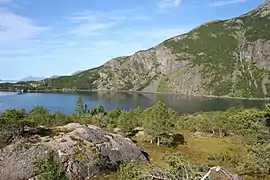 Djupfjorden in Sortland
Djupfjorden in Sortland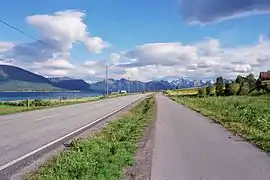 View from Sortland looking south
View from Sortland looking south Sortland Bridge and Hurtigruta, February 2007.
Sortland Bridge and Hurtigruta, February 2007. View of the Sigerfjorden. The village closest is Sigerfjord, and across the sound in the background is Sortland town.
View of the Sigerfjorden. The village closest is Sigerfjord, and across the sound in the background is Sortland town.
References
- ↑ "Navn på steder og personer: Innbyggjarnamn" (in Norwegian). Språkrådet.
- ↑ "Forskrift om målvedtak i kommunar og fylkeskommunar" (in Norwegian). Lovdata.no.
- ↑ Bolstad, Erik; Thorsnæs, Geir, eds. (26 January 2023). "Kommunenummer". Store norske leksikon (in Norwegian). Kunnskapsforlaget.
- ↑ "Stadnamn og rettskriving" (in Norwegian). Kartverket. Retrieved 13 July 2018.
- ↑ Statistisk sentralbyrå. "Table: 06913: Population 1 January and population changes during the calendar year (M)" (in Norwegian).
- ↑ Statistisk sentralbyrå. "09280: Area of land and fresh water (km²) (M)" (in Norwegian).
- ↑ "Nyttårs-sortlending blir nr. 10.000" (in Norwegian). Bladet Vesterålen. 23 December 2011.
- 1 2 Jukvam, Dag (1999). "Historisk oversikt over endringer i kommune- og fylkesinndelingen" (PDF) (in Norwegian). Statistisk sentralbyrå.
- ↑ "Endringer i de regionale inndelingene". Statistics Norway. 23 February 2018. Retrieved 1 January 2019.
- ↑ Rygh, Oluf (1905). Norske gaardnavne: Nordlands amt (in Norwegian) (16 ed.). Kristiania, Norge: W. C. Fabritius & sønners bogtrikkeri. p. 393.
- ↑ "Fastsetting av samisk navn på Sortland kommune, Nordland" (in Norwegian). LovData.no. 2 May 2017. Retrieved 19 November 2023.
- ↑ "Stadnamn og rettskriving" (in Norwegian). Kartverket. Retrieved 19 November 2023.
- ↑ "Civic heraldry of Norway - Norske Kommunevåpen". Heraldry of the World. Retrieved 4 February 2023.
- 1 2 "Sortland, Nordland". Flags of the World. Retrieved 4 February 2023.
- ↑ "Godkjenning av våpen og flagg". Lovdata.no (in Norwegian). Norges kommunal- og arbeidsdepartementet. 15 March 1985. Retrieved 4 February 2023.
- ↑ "Nordnorsk musikkstevne på Sortland, juni 1952. Abel Ellingsen taler". DigitaltMuseum Nord. Retrieved 19 November 2014.
- ↑ "Siste frostnatt om våren". 4 May 2012.
- ↑ "Første frostnatt". 25 September 2013.
- ↑ "Norwegian Meteorological Institute".
- ↑ "Norwegian Meteorological Institute".
- ↑ "World Meteorological Organization Climate Normals for 1991-2020 — Sortland". National Oceanic and Atmospheric Administration. Retrieved 11 January 2024.
- ↑ "eKlima Web Portal". Norwegian Meteorological Institute. Archived from the original on 14 June 2004.
- ↑ Hansen, Tore; Vabo, Signy Irene, eds. (20 September 2022). "kommunestyre". Store norske leksikon (in Norwegian). Kunnskapsforlaget. Retrieved 14 October 2022.
- ↑ "Kommunestyrevalg 2023 - Nordland". Valg Direktoratet. Retrieved 27 December 2023.
- ↑ "Tall for Norge: Kommunestyrevalg 2019 - Nordland". Valg Direktoratet. Retrieved 28 October 2019.
- 1 2 3 4 "Table: 04813: Members of the local councils, by party/electoral list at the Municipal Council election (M)" (in Norwegian). Statistics Norway.
- ↑ "Tall for Norge: Kommunestyrevalg 2011 - Nordland". Valg Direktoratet. Retrieved 28 October 2019.
- ↑ "Kommunestyrevalget 1995" (PDF) (in Norwegian). Oslo-Kongsvinger: Statistisk sentralbyrå. 1996. Retrieved 18 March 2020.
- ↑ "Kommunestyrevalget 1991" (PDF) (in Norwegian). Oslo-Kongsvinger: Statistisk sentralbyrå. 1993. Retrieved 18 March 2020.
- ↑ "Kommunestyrevalget 1987" (PDF) (in Norwegian). Oslo-Kongsvinger: Statistisk sentralbyrå. 1988. Retrieved 18 March 2020.
- ↑ "Kommunestyrevalget 1983" (PDF) (in Norwegian). Oslo-Kongsvinger: Statistisk sentralbyrå. 1984. Retrieved 18 March 2020.
- ↑ "Kommunestyrevalget 1979" (PDF) (in Norwegian). Oslo: Statistisk sentralbyrå. 1979. Retrieved 18 March 2020.
- ↑ "Kommunevalgene 1975" (PDF) (in Norwegian). Oslo: Statistisk sentralbyrå. 1977. Retrieved 18 March 2020.
- ↑ "Kommunevalgene 1972" (PDF) (in Norwegian). Oslo: Statistisk sentralbyrå. 1973. Retrieved 18 March 2020.
- ↑ "Kommunevalgene 1967" (PDF) (in Norwegian). Oslo: Statistisk sentralbyrå. 1967. Retrieved 18 March 2020.
- ↑ "Kommunevalgene 1963" (PDF) (in Norwegian). Oslo: Statistisk sentralbyrå. 1964. Retrieved 18 March 2020.
- ↑ "Kommunevalgene og Ordførervalgene 1959" (PDF) (in Norwegian). Oslo: Statistisk sentralbyrå. 1960. Retrieved 18 March 2020.
- ↑ "Kommunevalgene og Ordførervalgene 1955" (PDF) (in Norwegian). Oslo: Statistisk sentralbyrå. 1957. Retrieved 18 March 2020.
- ↑ "Kommunevalgene og Ordførervalgene 1951" (PDF) (in Norwegian). Oslo: Statistisk sentralbyrå. 1952. Retrieved 18 March 2020.
- ↑ "Kommunevalgene og Ordførervalgene 1947" (PDF) (in Norwegian). Oslo: Statistisk sentralbyrå. 1948. Retrieved 18 March 2020.
- ↑ "Kommunevalgene og Ordførervalgene 1945" (PDF) (in Norwegian). Oslo: Statistisk sentralbyrå. 1947. Retrieved 18 March 2020.
- ↑ "Kommunevalgene og Ordførervalgene 1937" (PDF) (in Norwegian). Oslo: Statistisk sentralbyrå. 1938. Retrieved 18 March 2020.
External links
 Nordland travel guide from Wikivoyage
Nordland travel guide from Wikivoyage- Municipal fact sheet from Statistics Norway (in Norwegian)
- Information from Sortland Municipality (in Norwegian)
- Vesterålen Tourist information
- Forfjorddalen nature reserve (the oldest pine trees in Norway) (in Norwegian)

